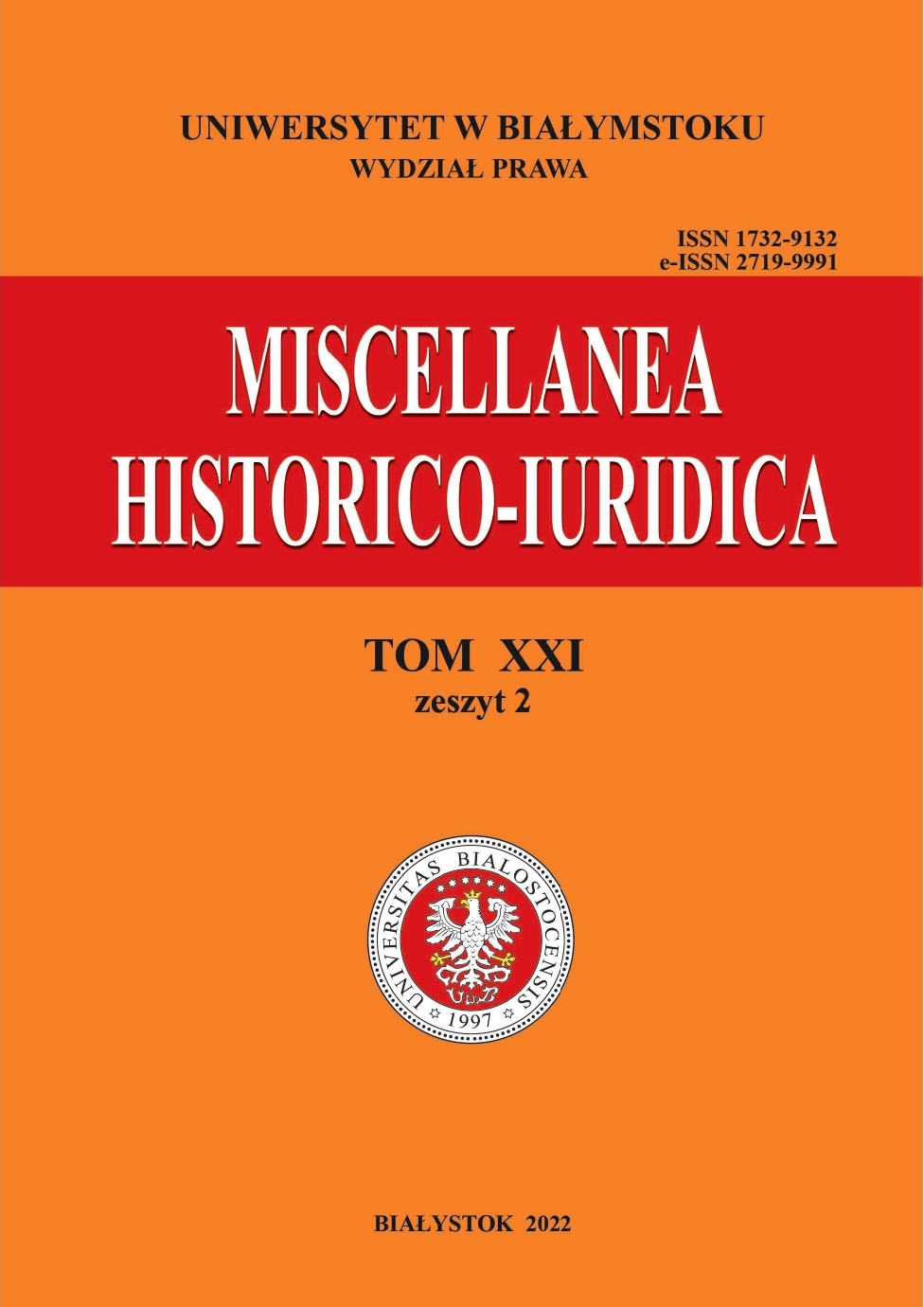Ius Caducum in Lublin in the First Quarter of the 17th Century
Keywords:
Ius caducum, escheat, Lublin, bourgeoisie, inheritance, monarchAbstract
The research objective of the study focuses on the functioning of the escheat law within cities. The research, although undertaken in a limited chronological scope, may contribute to the introduction of an issue that has not yet been recognized. The subject of the findings are the detailed issues of the functioning of the escheat law in former Poland, in particular the implementation of the monarch’s prerogative in the light of its limitations imposed in the parliamentary constitutions, the property scope of the escheat law and the issue of the participation of local royal state authorities, i.e. the starost’s office and local (municipal) government authorities, in the execution of the monarch’s decisions. Apart from persons appointed to the inheritance by virtue of law or will, the monarch could also participate in the inheritance proceedings. A heirless or testamentless inheritance fell to the king who, under the law of the escheat (ius caducum), embraced such an inheritance, which was then known in Poland as the “puścizna”. The ruler’s powers in the field of ius caducum were limited by the parliamentary constitutions requiring the king to grant noble goods acquired under the escheat law only to distinguished persons from among the nobility. These restrictions did not apply to the king’s administration and disposal of the bourgeois escheat goods. The process of granting by the king the caduceus estates of the burghers to the nobility are presented on the basis of royal documents concerning the inheritance of Lublin residents passing down to the nobility in the first quarter of the 17th century. The sources used in the research are eighteen documents found in the books of the Crown Record kept by the royal chancellery. The applied research method relates to research on the sources of law. A feature of the presented findings is reliance on unpublished archival sources, which require taking into account the philological and palaeographic methods related to the preparation of sources for analysis.
References
Archiwum Główne Akt Dawnych w Warszawie, Metryka Koronna, Libri Inscriptiones, księgi: 146, 148, 159, 163, 165, 166, 168, 169, 173, http://www.agad.gov.pl/inwentarze/Metr_Korx.xml.
Bardach J., Historia Państwa i Prawa Polski, t. I, Warszawa 1964.
Dąbkowski P., Prawo prywatne polskie, t. 2, Lwów 1911.
Giedroyć F., Mór w Polsce w wiekach ubiegłych – zarys historyczny, Warszawa 1899.
Gloger Z., Encyklopedia staropolska ilustrowana, t. 2, Warszawa 1901.
Góźdź-Roszkowski K., Obowiązek rozdawania dóbr skonfiskowanych w ustawodawstwie polskim XVI stulecia, „Zeszyty Naukowe Uniwersytetu Łódzkiego” 1971, S. I, Z. 83.
Góźdź-Roszkowski K., Obowiązek rozdawania dóbr skonfiskowanych w ustawodawstwie polskim XVI stulecia, „Zeszyty Naukowe Uniwersytetu Łódzkiego” 1971, S. I, Z. 83.
Góźdź-Roszkowski K., Rozdawnictwo skonfiskowanych dóbr ziemskich w prawie polskim XV-XVI wieku, Wrocław 1974.
Kaczmarczyk Z., Leśnodorski B., Historia Państwa i Prawa Polski, t. II, Warszawa 1966.
Kizik E., Prawo kaduka w Gdańsku w XVI-XVIII wieku, „Kwartalnik Historii Kultury Materialnej” 2004, t. 52, nr 1.
Kuryłowicz M., Krąg spadkobierców ustawowych w ujęciu prawnohistorycznym, „Rejent” 2003, nr 11 (151).
Kuryłowicz M., Wiliński A., Rzymskie prawo prywatne. Zarys wykładu, Warszawa 2008.
Riabinin, J., Proces sukcesorów rajcy lubelskiego Stanisława Lichańskiego 1622 r.: (przyczynek do prawa kaduka), Lublin 1937.
Urzędnicy województwa lubelskiego XVI-XVIII wieku. Spisy, oprac. W. Kłaczewski, W. Urban, pod red. A. Gąsiorowskiego, Kórnik 1991.
Ustawa z dnia 23 kwietnia 1964 r. Kodeks cywilny (Dz.U. 2020, poz. 1740, z późn, zm.).
Volumina Legum, t. 2, Petersburg 1859.
Downloads
Published
Issue
Section
License
Copyright (c) 2022 Uniwersytet w Białymstoku (entire issue as a whole); Krzysztof Seroka (article)

This work is licensed under a Creative Commons Attribution-ShareAlike 4.0 International License.







